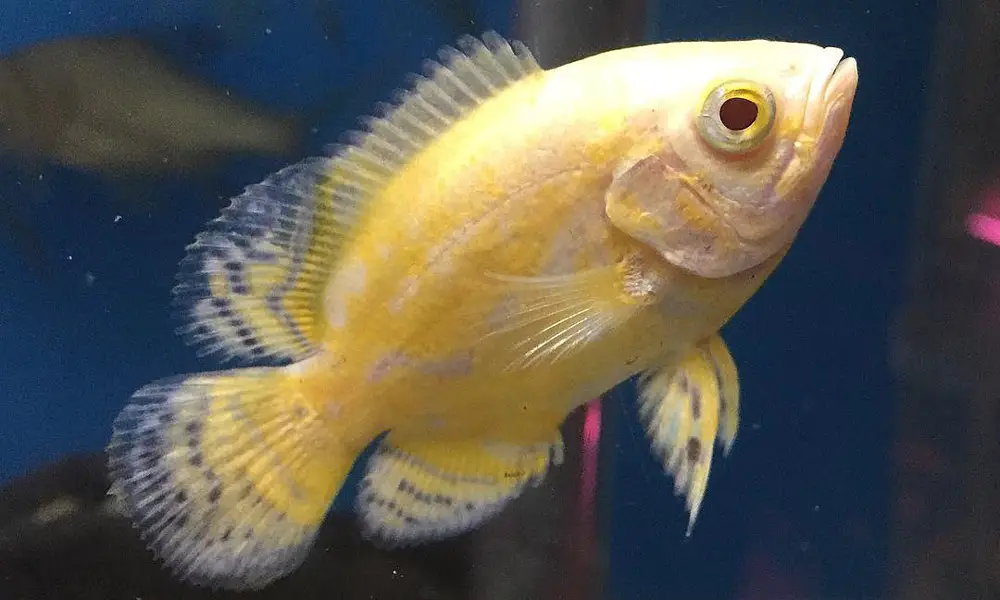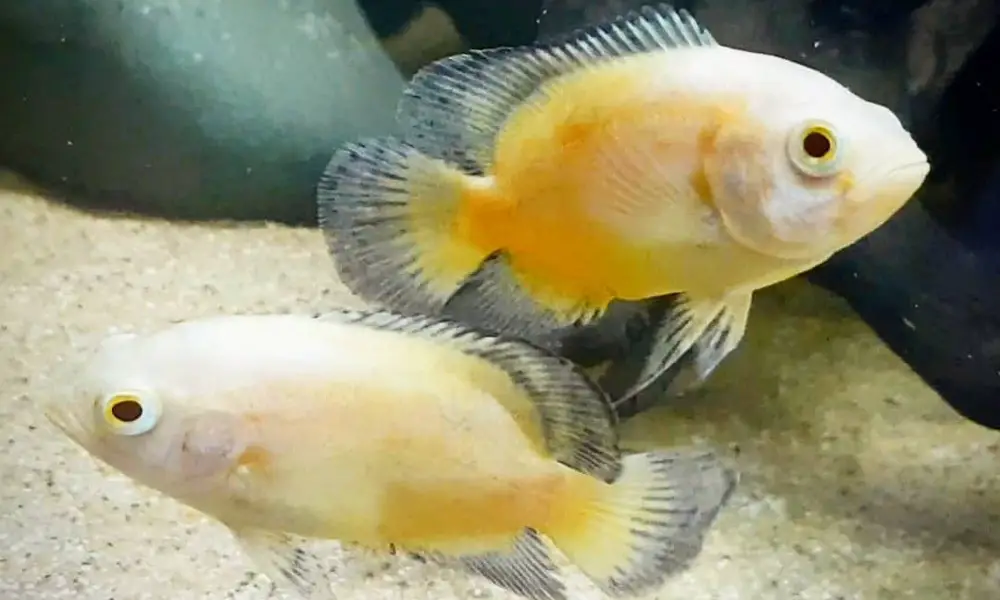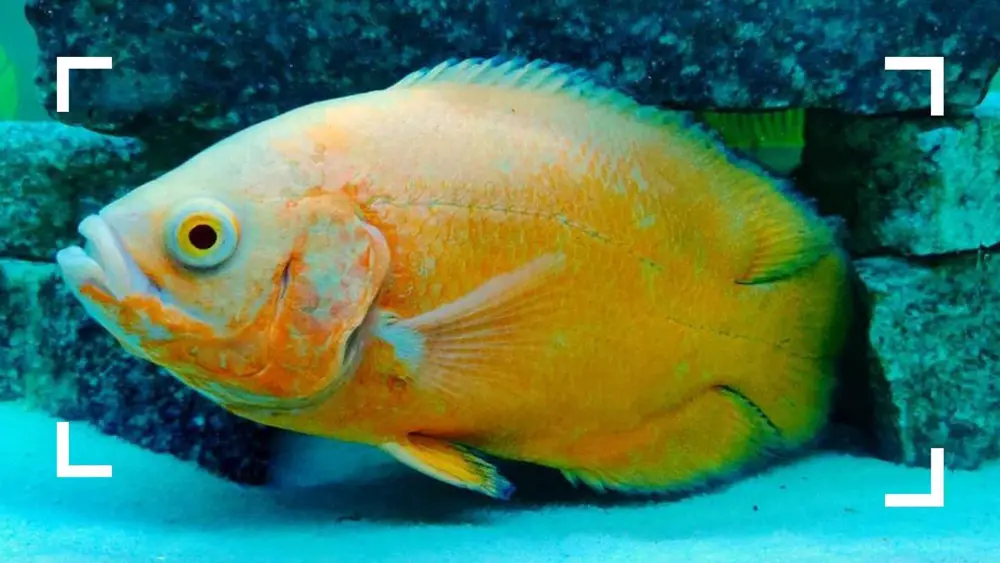Are you an oscar cichlids fan and want to make a stunning addition to your aquarium? If so, then look no further than lemon oscar. This freshwater fish is an appealing color variety of the Oscar Cichlid, making them a worthy choice for your community aquarium.
Like any variety of Oscar fish, these vibrant lemon yellow Oscars are not quite belligerent and aggressive, but they can swallow any fish that fits into their mouths due to their hearty appetite. Despite their natural aggression, these are easygoing fish, making them an ideal collection for beginners and pro aquarists alike.
Still thinking about whether adding Lemon Oscar is the right decision or not? Here’s a comprehensive guide covering everything about this striking oscar cichlid variety, including ideal tank mates, suitable food, and tank parameters. Scroll down the page and decide accordingly.
Species Summary
The Lemon Oscar is a selectively bred color variety of the extremely popular Oscar cichlid in the aquarium community. Though wild-caught Oscars are still readily available, there are many color morphs of this freshwater fish that have been developed over the years.
While their ancestors used to originate from the region of Amazon Basil in South America, these species are now accidentally found in the natural environments of Australia, China, and Florida as a resulting offshoot of the aquarium trade.
Lemon Oscars belong to the genus Astronotus, scientifically known as Astronotus ocellatus. Aquarists know them by their common name, Lemon Oscar or Lemon Yellow oscar.
There are only two species in this genus, A. crassipinnis and A. ocellatus. Both species are found in the Southern Amazon basin, while the lesser-known A. crassipinnis can also be found in the Paraná–Paraguay basins.
| Scientific Name: | Astronotus ocellatus |
| Common Name: | Lemon Oscar, Lemon Yellow Oscar |
| Origin: | South American |
| Aggressiveness: | Large Aggressive – Predatory |
| Max Size: | 10 – 12 inches (25 – 30 cm) |
| Lifespan: | 10 to 13 years |
| pH: | 6 – 8 |
| Temperature: | 72 to 86° F (22 to 30° C) – Aim for 80 – 86 ° F |
| KH: | 5 – 19 KH |
| Tank Size: | Minimum: 75 Gallons | Optimal: 125 Gallons |
| Diet: | Carnivore |
Appearance

What makes the lemon oscar a desirable pet for most fishkeepers is its eye-catching coloration and unique appearance. As its name suggests, they feature an opaque, creamy-white body with vibrant lemon yellow coloring, and their coloration and appearance make them visually different from other dark-colored Tiger Oscars.
Their eyes are pretty large, and the yellow coloration is mostly present on their sides and is rarely patterned. These fish are long and egg-shaped with symmetrical and standard caudal fins. Owing to the unique shape of dorsal and anal fins, these species look like big torpedoes swimming in aquariums.
Lemon Oscar Size
The average Lemon Oscar size is around 10 – 12 inches (25 – 30 cm) when fully grown.
Oscars are one of the fastest-growing fish in the hobby you’ll come across. The average purchase size of Lemon Oscar is between an inch and 2 inches. You can expect a growth rate of up to one inch (2.5 cm) a month for the first seven or eight months of their life, slowing thereafter. Most of the time, Lemon Oscars can easily grow up to 7 – 8 inches inside a year.
As always, there will be differences between individuals. Some Lemon Oscars will grow a little faster than others, while some may not reach their full potential size if the environment or diet isn’t ideal.
Lifespan
Just like other popular captive-bred varieties, the average lifespan of Lemon Oscar typically ranges between 10 and 13 years with optimal care. However, they can survive for 15 years as well with excellent care and a well-balanced diet.
If you fail to care for these fish properly, their lifespan will be significantly reduced. So, it would help if you kept that in mind before adding Lemon Oscars to your home aquarium.
Additionally, being a well-known selectively-bred variety, genetics can influence the lifespan of Lemon Oscar cichlids. If they are bred by parents with a long lifespan, you can expect the same from their offspring. Therefore, purchasing from reputable breeders is another important factor in getting Lemon Oscars that can live long in captivity.
Lemon Oscar (Astronotus ocellatus) care
In the wild, Oscars are native to shallow, slow-flowing streams and waters rivers with muddy or sandy bottoms. They will thrive in the aquarium that replicates their natural habitat.
While these fish are hardy, easygoing, and long-lived, it doesn’t mean that you can skip over their care. They are still cichlids, after all, are will require some effort to manage their temperament in captivity.
Here’re a few Lemon Oscar care guidelines to follow. Get the basics right and make these fish happy and healthy for a long time.
Tank Size
A minimum of 75 gallons (48″ x 18″ x 21″) with a sump or heavily filtered tank is required to keep an adult Lemon Oscar.
Some aquarists suggest that you can go for 55 gallons (48″ x 13″ x 21″). It’s acceptable but not recommended as it’s too narrow for the fish to be able to turn around.
According to my first-hand experience, for a single Texas Cichlid, I recommend a tank size no smaller than 125 gallons (72″ x 18″ x 21″). If you are planning to breed them in captivity, make sure to keep a pair in a tank as large as 150 gallons (72″ x 18″ x 28″).
Always ensure that you have an appropriately-sized tank before adding these species to give them enough space to grow.
Water Parameters
Once you have chosen the right tank size, it’s time to set the ideal water conditions to keep the Oscars. These are freshwater species that do fine as long as the water is clean and clear.
Remember that water conditions are directly related to their growth rate and lifespan; thus, shouldn’t be compromised. Stick to the ideal tank conditions and avoid changing the water chemistry too often.
Lemon Oscars are VERY messy eaters and will produce a large amount of waste. Therefore, you must be dedicated to doing a 50% water change every week.
In terms of filtration, I recommend using a sump because of more water volume. If you don’t have a sump, then use two “rated” canister filters. Lemon Oscars are messy fish and will require high filtration rates. The Fluval FX4 is a high-performance canister filter that will work perfectly for a Lemon Oscar tank.
[amazon box=”B00N45GLZQ”]Follow the parameters mentioned below to avoid any trouble later on.
- pH: 6.0 – 8.0
- Water Temperature: 72 to 86° F (22 to 30° C) – Aim for 80 – 86 ° F
- Hardness: 5 – 19 KH
- Ammonia: 0 ppm
- Nitrite: 0 ppm
- Nitrate:<30 ppm
Decor (Plants and Substrate)
Oscars prefer living on a deep sandy bottom; Adding fine sand or small gravel to their aquarium as a substrate is suggested. Moreover, place a few large rocks and driftwood to offer them visual barriers.
Keep in mind that these cichlids love digging up plants. Using floating plants is a good idea. Anacharis, hornwort, and water sprite are some of the best floating plants that Lemon Oscars love.
Having said that, these fish will not bother live plants if they are potted in gravel or rocks. Java Ferns and Amazon Swords are some of the best aquarium plants that you can go for.
Food
Lemon Oscars are carnivores with a large appetite. In the wild, their diet consists of smaller fish, crustaceans, insects, and worms. These fish are opportunistic feeders, which means that they will eat anything they can into their mouths.
In captivity, you can feed them live, frozen, or pellets food. Goldfish, feeder guppies, and worms are some of the best live foods that Lemon Oscars love as they grow larger. You can also offer them frozen foods like bloodworms, daphnia, and brine shrimp.
Meats from warm-blooded animals should be avoided as they can lead to dangerous intestinal blockages.
They also accept vegetables and fruits like peas, carrots, and zucchini. Frozen peas have been proved to be a secret weapon to boost the Lemon Oscar’s coloration and vigor.
Oscar cichlids will also accept pellets as a staple diet. I recommend using high-quality pellets that are rich in proteins and nutrients. Some of the best pellets for Lemon Oscars are Hikari Cichlid Gold, New Life Spectrum, and NorthFin Foods. The NLS is the best pellets that I have used for Oscars, but it’s somewhat costly.
[amazon box=”B001AEOX7G”]Lemon Oscar Tank Mates

Although Lemon Oscars are not as territorial as other cichlids, they are predatory and can consume anything that can easily fit into their mouth. Owing to this, you should choose the appropriate tank mates.
These species are mild-mannered and are best kept either in a species-only tank or with other identical-sized fish that can hold their own.
If you want to keep your Lemon Oscars in a mixed cichlid community. Firstly, the tank size should be at least 200 gallons or more. Secondly, Lemon Oscars should be the last fish to add to the aquarium as they are quite aggressive. Also, slow-growing fish like convict cichlid and Firemouths might be bullied by Lemon Oscars. It’s a high risk to introduce these fish with Lemon Oscars at the same time.
Avoid keeping small fish like Neon Tetras, Guppies, and Platies as they will end up becoming Lemon Oscar’s snacks.
Some good Lemon Oscar fish tank mates include:
- Silver Dollar Fish (Metynnis Argenteus)
- A school of 6-9 Pinktail Chalceus (Chalceus macrolepidotus)
- Jack Dempsey Cichlid (Rocio octofasciata)
- Red Tiger Severum (Heros Severus)
- Ornate Bichir (Polypterus ornatipinnis)
- Green Terror (Andinoacara rivulatus) [Female | Size | Tank Mates]
- Chocolate Cichlid (Hypselecara temporalis)
The list is not exhaustive, and there are many other Lemon Oscar-friendly fish that you can introduce in the aquarium. It all depends on your fish’s temperament and tank size.
Breeding
Lemon Oscars are easy to breed in captivity. They become sexually mature when they reach about 4.5 inches (11.4 cm). They are egg layers and open water spawners. Using flat smooth stones to create spawning flats is recommended.
To induce Lemon Oscar spawning, you should increase the water temperature between 78.8 – 86° F (26 – 30° C). The pair will clean a suitable spawning site together before the female Lemon Oscar lays eggs.
The female Lemon Oscar will lay about 1000-2000 eggs. They are excellent parents and will take care of the brood together. The fry will hatch after 2-3 days, and the parents will move them to a pit or cave. Free swimming fry should be fed on Cyclops.
Final Thoughts
So, that’s all about Lemon Oscar care fundamentals. We hope this post has helped you learn more about these beautiful species so you can make a worthy decision. These Oscars are easy-to-care-for and require low maintenance, making them an ideal choice for novice and advanced fish keepers.
The other thing that makes it a perfect addition is its long lifespan. The idea of owning and caring for them for a pretty long time is absolutely amazing and worth considering. Moreover, they are easy to breed in captivity, which is an added plus.
So, what are you waiting for? Add these brilliant-looking species to your tank now, and we assure you that the experience will be rewarding.
If we miss something important or you have any queries, please feel free to leave a comment below. We would be happy to hear from you!
